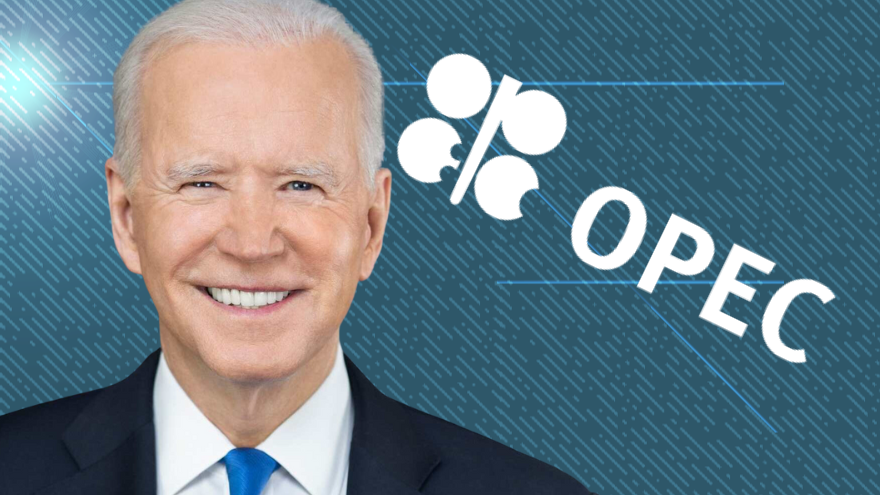Despite having drained the U.S. Strategic Petroleum Reserve (SPR) to historic lows, the Biden administration has now delayed refilling the critical supply, citing market forces as the reason.
In 2022, President Joe Biden ordered the release of one million barrels of oil per day from the U.S. strategic reserve in a bid to have America be the world’s hedge against global price increases due to the war in Ukraine and other factors.
U.S. officials have said on record that American oil was “critical to U.S. national security and to the economic and national security of our allies throughout Europe and the world,” while adding that America is a hedge against foreign enemies who could weaponize their energy supplies.
More than five million barrels of America’s SPR were exported to Europe and Asia, even as U.S. gas prices hit record highs. Additionally, one million barrels were sold to a subsidiary of a state-owned Chinese gas company in which Biden’s son’s private equity firm held a $1.7 billion stake.
The Biden administration released 180 million barrels, according to a White House fact sheet, reducing America’s emergency oil stockpile to its lowest level in nearly 40 years.
Earlier this year, the Energy Department announced plans to refill the SPR, aiming to secure 6.3 million barrels by November. The Biden administration estimated it would be paying an average price of $72.67 per barrel, which is three times higher than the price the Trump administration negotiated.
Currently, tight oil supplies have driven global prices to rise above $80 per barrel, leading the U.S. to hold off on repurchasing oil for the nation’s emergency supply because of “market conditions,” an Energy Department spokesperson said.
The spokesperson also said the Department “remains committed to its replenishment strategy for the SPR, including direct purchases when we can secure a good deal for taxpayers; exchange returns; and cancellation of planned sales where drawdown is unnecessary, in coordination with Congress.”
Some see the draining of the SPR as a purely political move.
“The U.S. made the latest solicitation to buy the sour crude oil for the SPR on July 7, and follows the release of a record 180 million barrels from the reserve last year to prevent a Democrat rout in the midterms following Russia’s invasion of Ukraine,” a post on ZeroHedge states. “Of course, by refusing to refill now, it only ensures that when the need truly arises, Biden, or rather his successor, will be forced to buy the oil at triple digits.”
Translation: $65 was too cheap, we'd rather wait until oil is $130 https://t.co/wYlcciUiof
— zerohedge (@zerohedge) August 1, 2023
Others have suggested that foreign oil producers are manipulating the price to snub Biden by not allowing the U.S. to refill the SPR at the administration’s desired price.
“You can’t make this up: Crude oil prices are about to hit $80 again and gas prices nearing $4.00,” The Kobeissi Letter, a self-described industry leading commentary on global capital markets, wrote on social media platform X. “In October 2022, President Biden announced that the US would refill the Strategic Petroleum Reserve (SPR) when oil prices fell to $67-72. Every single time this has happened, OPEC+ has announced bullish news. This can’t be a coincidence.”
You can't make this up:
Crude oil prices are about to hit $80 again and gas prices nearing $4.00.
In October 2022, President Biden announced that the US would refill the Strategic Petroleum Reserve (SPR) when oil prices fell to $67-72.
Every single time this has happened,… pic.twitter.com/mXtO14cxDi
— The Kobeissi Letter (@KobeissiLetter) July 25, 2023
Last month, officials said it could take years to refill the SPR, pushing out the anticipated date for full replenishment beyond Biden’s first term.
The administration has not indicated what it intends to do if prices do not recede to its desired purchase price.
Oil prices are expected to rise amid deeper production cuts from OPEC leader Saudi Arabia.
“We expect stocks to draw relatively aggressively in July, and by the end of August, we should be through the stock builds that we saw in the first half of the year,” said Christopher Haines, an analyst at Energy Aspects. “We are on the cusp of supply tightness. Saudi cuts are essentially accelerating the timeline.”

